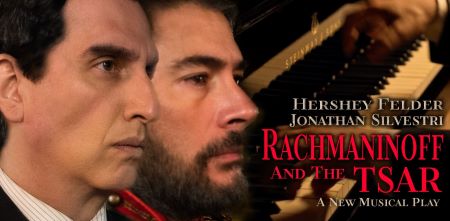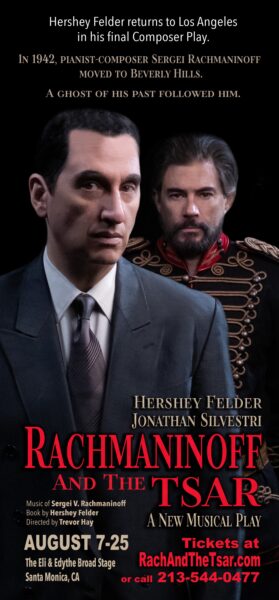For 26 years, pianist/actor/playwright/producer Hershey Felder has conjured the spirits of George Gershwin, Frederic Chopin, Ludwig van Beethoven, Franz Liszt, Leonard Bernstein, Piotr Ilyich Tchaikovsky, and Irving Berlin on Los Angeles area stages, where his music-composer series was born, and around the world. Along the way, audiences have flocked to his astonishing musical tributes, from classical masters to American composers, sharing not only their music but the history and personal life stories reflected in their compositions.
And now he returns to the stage with the world premiere of a new play, Rachmaninoff and the Tsar, which tells of the Russian composer leaving Russia safely during the 1917 revolution to receiving his American citizenship in 1942 at the age of 68. The new musical play begins at the BroadStage in Santa Monica August 7 – 25, 2024 before going on tour. I spoke with Hershey for Stage and Cinema about the creation of the new piece, what led him to this composer, and why for the first time, Felder will play opposite another artist, British-Italian Jonathan Silvestri in the role of Tsar Nicholas II.
HERSHEY FELDER as Sergei Rachmaninoff
Stage and Cinema: Hi Hershey. It’s great to speak with you again. What inspired you to write about Sergei Rachmaninoff this time?
Hershey Felder: Rachmaninoff’s music was some of the earliest music I played professionally on the stage. My teacher at the time in Montreal, Dorothy Morton, esteemed from McGill University, thought I had an aptitude for his music, that it seemed natural to me. She assigned me a great number of Rachmaninoff Preludes, at least half a dozen. I was twelve. She said I saw imagery in his music as she asked me describe what I saw when I played. It was a story I definitely wanted to know more about. Those early lessons stayed with me.
S&C: Is there anything about his life that is think is similar to your own?
HF: If anything, things that plague many who work in this profession; loneliness, self doubt, “writer’s block,” a sense of constantly looking for “home,” or trying to return “home,” only to discover that home is not what we thought it was ’¦ that kind of stuff.
S&C: I know your most recent performances were solo productions where you performed as the composer, sharing both their music as well as highlights from their personal lives and world history. What makes your new play similar or different as a fully staged production?
HF: The others were all fully staged productions as well, this one however features another artist, a magnificent actor, Jonathan Silvestri, whom I met in Europe on the set of my film about Chopin and Liszt, where he played Delacroix. Besides wanting to act with him again, he fit the role of the Tsar like a glove, and this story, for reasons that reveal themselves during the play needs to be told with two people at least, and not the artist speaking directly to the audience, as in many of my other pieces.
S&C: Did the composer and the Russian tsar ever meet?
HF: Yes, there was one meeting at the Winter Palace just after Rachmaninoff became very famous all over Russia for his second piano concerto. The meeting was arranged by the Tsar’s brother, Mikhael, who was a fan of Rachmaninoff’s music.
S&C: Have you visited the places in Russia where Rachmaninoff or the Tsar lived? If so, what are some of the memories you share about those experiences in the play?
HF: Only virtually. Alas.
S&C: I read you will playing Rachmaninoff’s most beautiful music including the Second Piano Concerto, the Paganini Variations, Preludes, and Symphonic Selections. How do you think these selections reflect directly to the times in which the composer was living?
HF: As with most of the work that I do, I try to identify the context behind the composition. Herein I do the same. The context is very personal for him, and I hope that I have succeeded in bringing that across.
HERSHEY FELDER as Sergei Rachmaninoff & JONATHAN SILVESTRI as Tsar Nicholas II
S&C: How was Rachmaninoff able to leave Russia at the age of 43, during the Russian revolution in 1917?
HF: Well, he left during the revolution, and while this information is in the play, I give it here as well. He was invited to play in Copenhagen and miraculously got a Visa to do so.
S&C: Where did he first settle in the United States?
HF: In New York, in 1918.
S&C: Why do you think he decided to move to Beverly Hills in 1942?
HF: He loved it here. The Russian community was very warm to him. There were other Russian artists who were here at the time, great ones, and there was a community. This was important to him. So was the beauty and nature, the weather – the thing that brings many to Southern California.
S&C: Do you think he ever wanted to go back to Russia?
HF: To the Russia of his childhood, yes.
S&C: You live in such beautiful cities, Paris and Florence, which are two of my favorites to visit. As a composer, where do you get the most inspired to create your plays, and why?
HF: Within the music and storytelling itself. But it does help to live in Florence surrounded by a history and actual proof that humans can make the world more beautiful.
S&C: When you are composing, is it necessary to know how the music will sound inside the venue? And if so, do you adapt the music for different locations?
HF: Yes and no. The music has a concept. How that concept is presented in each location influences the performance.
S&C: Of all the places you have performed music, do you have a favorite?
HF: My living room. No taxi to work.
S&C: What do you think makes the Eli and Edythe Broad Stage in Santa Monica so perfectly matched to theatrical productions?
HF: Such a lovely grand but yet intimate space. Wonderfully calibrated. Open, bright, beautiful and warm.
S&C: What do you think will surprise audiences about the two men?
HF: Rachmaninoff’s generosity and what it led to. The complicated humanity of Tsar Nicholas II.
S&C: Anything else you’d like to add about the play?
HF: Come see it!
S&C: Thanks so much. I will!
# # # #
photos by Andrea Savorani Neri
poster design by Stefano Decarli
Book by Hershey Felder, directed by Trevor Hay, dramaturgy Jerry Patch, lighting by Erik. S. Barry, scenic design by Hershey Felder, sound and production by Erik Carstensen, projections by Stefano Decarli, costumes by Marysol Gabriel and hair by Tom Watson.
Rachmaninoff and the Tsar
World Premiere
BroadStage, 1310 11th St in Santa Monica
August 7 – 25, 2024
one hour forty minutes, no intermission
then plays August 27 – 31, 2024 at the Balboa Theater, San Diego
for tickets, visit Ticketmaster
also plays South Coast Rep’s Segerstrom Stage February 19 – March 2, 2025
for tickets ($70-$110), visit SCR
then plays Ensemble Theatre Company in Santa Barbara April 3 – 20, 2025
for tickets, visit ETCSB
for more info and tour dates, visit Rach and the Tsar


